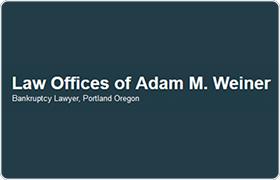Turner Bankruptcy & Debt Lawyer, Oregon
Sponsored Law Firm
-
 x
x

Click For More Info:
-
Law Offices of Adam M. Weiner
8624 SE 13th Ave Portland, OR 97202» view mapBankruptcy & Debt Premier Bankruptcy Attorney
Life doesn’t always have to be hard. Consult with a bankruptcy attorney who looks out for your best interests. Call today to begin the process for a fresh financial start.
503-719-5123
Rex K. Daines
Bankruptcy & Debt, Accident & Injury, Consumer Rights
Status: In Good Standing Licensed: 29 Years
FREE CONSULTATION
CONTACTKevin Dale Swartz
Child Custody, Consumer Bankruptcy, Bankruptcy, Personal Injury
Status: Retired Licensed: 26 Years
David W Jacobson
Bankruptcy, Business & Trade, Commercial Real Estate
Status: In Good Standing Licensed: 20 Years
Christopher Bruce Matheny
Estate Planning, Civil Rights, Contract, Credit & Debt
Status: In Good Standing
Kevin J Rank
Litigation, Consumer Bankruptcy, Bankruptcy, Bankruptcy & Debt
Status: In Good Standing Licensed: 33 Years
Brian E Hefner
Motor Vehicle, Divorce, Criminal, Bankruptcy & Debt, Personal Injury
Status: In Good Standing Licensed: 8 Years
 Adam M. Weiner Portland, OR
Adam M. Weiner Portland, OR Practice AreasExpertise
Practice AreasExpertise
